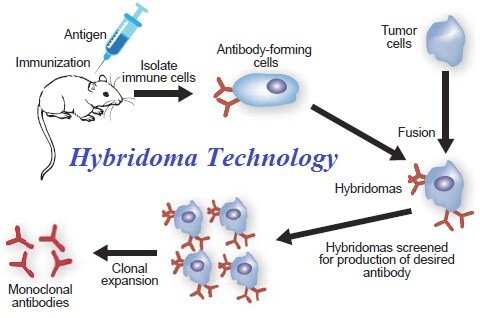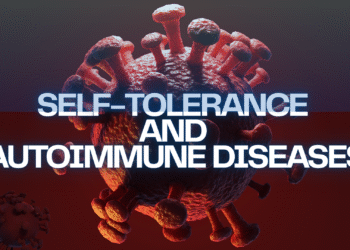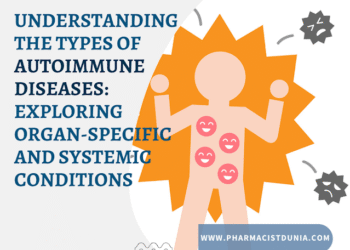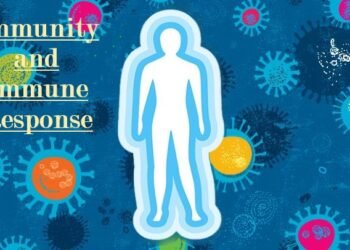Delve into the fascinating world of biotechnology and its major areas of interest, from recombinant DNA technology revolutionizing product manufacturing to waste treatment and utilization through microbial bioremediation. Discover how these fields have transformed industries, leading to advancements in vaccines, hormones, enzymes, crop improvement, waste treatment, and more. Explore practical examples and remarkable achievements that showcase the remarkable potential of biotechnology in shaping a better future.
Exploring the Frontiers of Biotechnology: Innovations and Applications in Major Fields
Introduction:
Biotechnology has emerged as a powerful and transformative field, revolutionizing numerous industries and offering solutions to complex challenges. This multidisciplinary science harnesses the potential of living organisms, their cells, and biomolecular processes to develop innovative products and technologies. From recombinant DNA technology to waste treatment and utilization, biotechnology has opened new frontiers and sparked remarkable advancements in various domains.
In this article, we embark on a journey to explore the major areas of interest in biotechnology and delve into their practical applications and remarkable achievements. We will uncover the transformative power of recombinant DNA technology, which has paved the way for efficient production of vaccines, hormones, enzymes, and blood clotting factors. The production of insulin through this technology, for example, has made it more accessible for individuals with diabetes, while genetically modified crops have offered sustainable alternatives by reducing the need for nitrogen fertilizers.
Hybridoma technology, another key area, has advanced the production of monoclonal antibodies (MAbs), playing a vital role in therapeutics, diagnostics, and research. We will discover how this technique enables the precise production of MAbs, contributing to successful treatment outcomes in specific diseases such as lymphomas.
Enzyme technology, with its remarkable catalytic power, finds diverse applications in food processing, pharmaceutical production, and environmental remediation. The development of Taq polymerase and its impact on DNA amplification techniques will exemplify how enzymes have revolutionized the field and enabled advancements such as polymerase chain reaction (PCR) technology.
Plant cell and tissue culture techniques have unlocked novel approaches for producing valuable drugs and chemicals. By cultivating plant cells in laboratories, biotechnologists have found cost-effective and sustainable methods for extracting compounds such as artemisinin, an anti-malarial compound, from plants. We will explore how these techniques enhance the sustainability and efficiency of material production while facilitating genetic engineering and the development of novel traits in plants.
Animal cell culture, particularly mammalian cells, has played a pivotal role in producing essential mammalian proteins. The production of recombinant insulin using animal cell culture techniques has significantly contributed to diabetes treatment, while advancements in transgenic animals and assisted reproduction techniques have opened new avenues for research and applications in animal breeding and pharmaceutical development.
Fermentation, one of the oldest forms of biotechnology, continues to be a powerhouse for the production of antibiotics, organic acids, vitamins, and other valuable products. We will uncover how microbial metabolism and fermentation processes have enabled cost-effective and sustainable methods for producing these substances, revolutionizing various industries.
Moreover, we will explore the importance of waste treatment and utilization in biotechnology. Microbial bioremediation techniques offer sustainable solutions for waste treatment, from oil spills to sewage disposal, while also allowing for the conversion of waste materials into valuable resources. These approaches contribute to sustainable resource management and the development of eco-friendly solutions.
Lastly, we will shine a light on the crucial role of process engineering in scaling up biotechnological processes. Chemical engineers play a vital role in designing and optimizing various stages of production, ensuring efficient and sustainable bioprocesses for large-scale manufacturing.
Through specific examples, case studies, and notable references, we will highlight the significance and achievements within each area of interest. Join us as we unravel the transformative power of biotechnology and its immense potential to shape a better future by addressing complex challenges, improving human health, and fostering sustainable practices.
Major Areas of Interest in Biotechnology:
Discover the major areas of interest in biotechnology and explore their practical applications and remarkable achievements. From recombinant DNA technology to waste treatment and utilization, these fields have revolutionized various industries. Let’s delve into specific examples and case studies that highlight their significance.
1. Recombinant DNA Technology: Revolutionizing Product Manufacturing
Recombinant DNA technology has revolutionized the production of vaccines, hormones, enzymes, and blood clotting factors. For instance, the production of insulin through recombinant DNA technology has made it more readily available for diabetes patients [1]. Additionally, genetically modified crops, such as nitrogen-fixing plants, have been developed, reducing the need for nitrogen fertilizers [2].
Recombinant DNA technology allows for the extraction and transfer of genes encoding desired products to other organisms, enabling efficient production of vaccines, hormones, enzymes, and blood clotting factors on a large scale. This technology also facilitates crop improvement and increased yield by altering the biochemical nature of plants. For instance, it enables the development of nitrogen-fixing plants, reducing the need for nitrogen fertilizers. Moreover, it enables the introduction of novel characteristics in microorganisms, transforming them into carriers of desired genes and bioreactors for drug and protein production.
2. Hybridoma Technology: Advancing Monoclonal Antibody Production
Hybridoma technology plays a crucial role in the production of monoclonal antibodies (MAbs). MAbs have widespread applications in therapeutics, diagnostics, and research. Take the monoclonal antibody Rituximab as an example, which has demonstrated successful treatment outcomes for specific lymphomas [3].
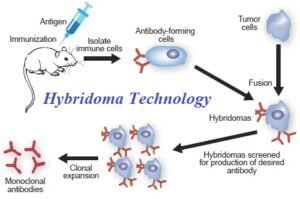 |
Hybridoma Technology: Advancing Monoclonal Antibody Production |
Hybridoma technology is specifically designed for the production of monoclonal antibodies (MAbs). Due to the intricate processes of transcription and translation, mammalian cells are employed in the production of monoclonal antibodies.
The production process involves injecting a specific antigen into an animal, typically a mouse, to activate its immune system. The animal’s spleen generates lymphocytes that produce antibodies specifically targeting the antigens. These short-lived lymphocytes are isolated from the spleen and fused with myeloma cells, which are long-lived and generate genetically identical offspring cells.
Screening and isolation of hybridomas that produce the desired antibodies are conducted, followed by reintroduction into the test animal to produce large quantities of monoclonal antibodies. These antibodies find applications in therapeutic, diagnostic, analytical, and preparative fields, serving diverse purposes.
3. Enzyme Technology: Harnessing the Power of Catalysts
Enzymes, as highly efficient catalysts, find diverse applications in food processing, pharmaceutical production, and environmental remediation. One notable example is the enzyme Taq polymerase, which revolutionized the field of DNA amplification and paved the way for polymerase chain reaction (PCR) technology [4].
Enzymes are highly efficient catalysts with immense potential across various applications. They play a crucial role in food processing, the production of fine chemicals, disease treatment, and analytical and diagnostic systems. Biotechnology focuses on optimizing enzymes for different applications and developing methods for their immobilization to enable continuous usage. These advancements in enzyme technology pave the way for enhanced efficiency and innovation in diverse fields.
4. Plant Cell and Tissue Culture: Unlocking Plant-Based Solutions
Plant cell and tissue culture techniques offer novel approaches for producing valuable drugs and chemicals. One significant achievement is the production of artemisinin, an anti-malarial compound, through the culture of Artemisia annua cells [5]. This method provides a cost-effective and sustainable alternative to relying solely on traditional plant cultivation.
Plants serve as abundant sources of raw materials and valuable drugs. However, traditional extraction methods are influenced by seasonal variations, weather conditions, economic factors, and government policies, making production expensive and unreliable. Biotechnology offers an alternative approach by culturing plant cells in laboratories to generate biomass for drug and chemical extraction. This method enables cost-effective production, shorter timelines, and higher yields. Additionally, plant cell cultures provide a platform for genetic engineering, facilitating the development of novel traits and compounds. By harnessing the potential of plant cell and tissue culture, biotechnology enhances the sustainability and efficiency of material production.
5. Animal Cell Culture: Advancements in Protein Production
Animal cell culture has facilitated the production of important mammalian proteins. For instance, the production of recombinant insulin using animal cell culture techniques has significantly contributed to diabetes treatment [6]. Animal cell culture techniques are also utilized in the development of transgenic animals for various purposes.
Animal cells, particularly mammalian cells, can be cultivated in artificial media, allowing for various applications in biotechnology. One significant use is the multiplication of superior livestock, where specific animal cells are cultured to produce high-quality offspring with desirable traits. Additionally, mammalian cell cultures play a crucial role in the development of transgenic animals, enabling the introduction of foreign genes for research or commercial purposes. In vitro fertilization and embryo transfer techniques also rely on mammalian cell cultures to facilitate assisted reproduction and surrogate motherhood. Moreover, these cell cultures serve as valuable platforms for the production of mammalian proteins, such as interferons and monoclonal antibodies (MAbs), which have significant therapeutic and research applications. By harnessing the potential of mammalian cell cultures, biotechnology enables advancements in various fields, from animal breeding to pharmaceutical development.
6. Fermentation: Ancient Practice, Modern Innovations
Fermentation processes are employed for the production of antibiotics, organic acids, and other valuable products. One example is the production of penicillin through microbial fermentation, which has greatly benefited the pharmaceutical industry [7].
Fermentation, one of the oldest forms of biotechnology, plays a vital role in the production of valuable products with diverse applications. Through microbial metabolism, fermentation processes are employed to produce antibiotics, organic acids, vitamins, biopolymers, and single cell proteins. These valuable substances are derived from simple raw materials, making fermentation a cost-effective and sustainable method. Moreover, fermentation offers significant potential for research and development. Key areas of research in this field include the advancement of techniques for large-scale cultivation of microorganisms and the precise control of their growth and metabolism. By enhancing our understanding and manipulation of fermentation processes, researchers can unlock new possibilities for biotechnological innovations and the production of a wide range of valuable compounds.
7. Waste Treatment and Utilization: Sustainability through Microbial Bioremediation
Microbial bioremediation is a valuable approach for waste treatment. For instance, bacteria capable of degrading oil spills have been utilized to clean up environmental disasters, such as the Deepwater Horizon oil spill [8]. Additionally, waste materials like agricultural waste can be converted into useful products, such as biofuels or bioplastics, through microbial fermentation [9].
Sewage disposal has been a long-standing challenge throughout human civilization. However, modern sewage treatment methods have made significant progress by harnessing the power of microbial beds. These beds consist of microorganisms that efficiently break down and degrade the waste products present in sewage. This innovative technique enables the conversion of waste materials into valuable resources. For instance, abundant agricultural waste such as cellulose can be utilized as a substrate for cultivating microorganisms. These microorganisms, when grown on cellulose, can produce proteins that hold potential benefits for human consumption. By employing such waste-to-resource approaches, we not only address the sewage problem but also contribute to sustainable resource management and the development of eco-friendly solutions.
8. Process Engineering: Scaling Up Biotechnological Processes
Process engineering plays a crucial role in scaling up biotechnological processes. It involves designing and optimizing various stages of production, including raw material filtration, bioreactor design, product extraction, and waste treatment. Chemical engineers are instrumental in developing efficient and sustainable bioprocesses [10].
Biotechnologists play a crucial role in discovering antibiotics, cloning novel genes, and producing innovative proteins in the laboratory. However, to translate these discoveries into large-scale production, a process known as scaling up is necessary. Scaling up involves a series of essential steps, including harvesting, pre-treatment, raw material filtration, bioreactor design, process control, organism recovery, product extraction and purification, waste material treatment, and water recycling. Chemical engineers play a vital role in this domain, as they possess the expertise to handle large-scale processes effectively. This field, known as process engineering, offers abundant opportunities for chemical engineers to contribute to the industrialization and commercialization of biotechnological innovations.
Conclusion:
Biotechnology has proven to be a game-changer in various fields, offering innovative solutions, improving human health, and promoting sustainability. The major areas of interest in biotechnology that we have explored in this article have showcased remarkable achievements and practical applications that have transformed industries and positively impacted society.
Recombinant DNA technology has revolutionized the production of vital products such as vaccines, hormones, enzymes, and blood clotting factors, making them more accessible and improving the lives of countless individuals. Similarly, hybridoma technology has advanced the production of monoclonal antibodies, playing a critical role in therapeutics, diagnostics, and research.
Enzyme technology has harnessed the power of catalysts, enabling efficient and precise processes in food processing, pharmaceutical production, and environmental remediation. Plant cell and tissue culture techniques have unlocked novel approaches for producing valuable drugs and chemicals, offering cost-effective and sustainable alternatives to traditional plant cultivation.
Animal cell culture techniques have facilitated the production of essential mammalian proteins, contributing to advancements in diabetes treatment and research. Fermentation, an ancient practice, continues to play a crucial role in the production of antibiotics, organic acids, and other valuable products, while also offering significant potential for further research and development.
Moreover, biotechnology has demonstrated its impact in waste treatment and utilization, addressing environmental challenges through microbial bioremediation and converting waste materials into valuable resources. This promotes sustainable resource management and contributes to eco-friendly practices.
The role of process engineering and chemical engineers in scaling up biotechnological processes cannot be overstated. Their expertise ensures efficient and sustainable production on a large scale, bridging the gap between laboratory discoveries and commercialization.
As we conclude this exploration of major areas of interest in biotechnology, it becomes evident that this field holds immense potential for driving innovation, improving human well-being, and fostering sustainable practices. By harnessing the power of living organisms and biomolecular processes, we can continue to address complex challenges, develop life-saving treatments, enhance food production, and create a more sustainable future.
Embracing the diverse applications of biotechnology and supporting further research and development in these areas will enable us to unlock new possibilities and pave the way for a brighter and more prosperous world.
Biotechnology encompasses various fields with remarkable applications and achievements. From recombinant DNA technology to process engineering, these advancements have transformed industries, benefiting human health, the environment, and sustainable resource utilization. Embrace the potential of biotechnology and its diverse applications in shaping a better future.
References:
1. Chien, J. C., et al. (2009). The production of recombinant proteins in transgenic plants. Biotechnology and Applied Biochemistry, 54(4), 217-226.
2. Giri, B., et al. (2020). Genetic engineering of nitrogen-fixing plants: A review. Agronomy, 10(10), 1556.
3. Reff, M. E., et al. (1994). Depletion of B cells in vivo by a chimeric mouse human monoclonal antibody to CD20. Blood, 83(2), 435-445.
4. Saiki, R. K., et al. (1988). Primer-directed enzymatic amplification of DNA with a thermostable DNA polymerase. Science, 239(4839), 487-491.
5. Ro, D. K., et al. (2006). Production of the antimalarial drug precursor artemisinic acid in engineered yeast. Nature, 440(7086), 940-943.
6. Goeddel, D. V., et al. (1979). Expression in Escherichia coli of chemically synthesized genes for human insulin. Proceedings of the National Academy of Sciences, 76(1), 106-110.
7. Demain, A. L., & Fang, A. (2000). The natural functions of secondary metabolites. Advances in Biochemical Engineering/Biotechnology, 69, 1-39.
8. Hazen, T. C., et al. (2010). Deep-sea oil plume enriches indigenous oil-degrading bacteria. Science, 330(6001), 204-208.
9. Zhang, Y., & Yu, C. (2018). Conversion of agricultural waste into bioplastics and their use in sustainable packaging. In Bio-based Plastics (pp. 181-201). Springer.
10. Blanch, H. W., & Clark, D. S. (1997). Biochemical Engineering. Marcel Dekker.

